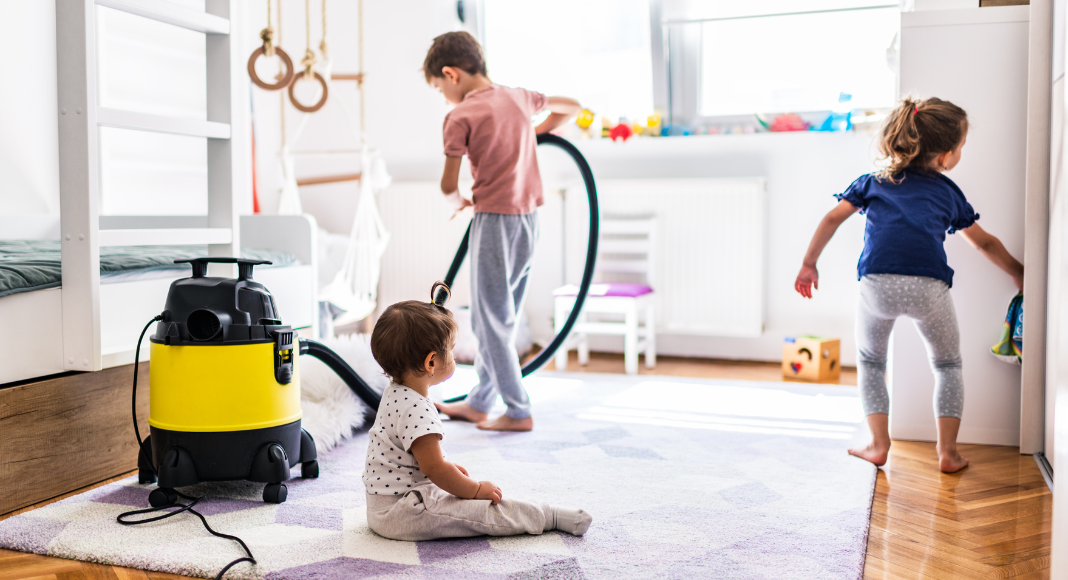 How do we motivate someone to naturally, intrinsically, want to do the things necessary in a given day? Jennifer Aniston’s famous line to Vince Vaughn in The Break Up, “I want you to want to do the dishes!” comes to mind for me.
How do we motivate someone to naturally, intrinsically, want to do the things necessary in a given day? Jennifer Aniston’s famous line to Vince Vaughn in The Break Up, “I want you to want to do the dishes!” comes to mind for me.
How can we motivate our kids to do the things we want them to do without rewards dangling in front of them?
Studies have shown that external motivation alone does not help someone want to do something more. Often, the task is completed to earn the reward, and the intrinsic motivation is out the window. [Gasp.] Did a behavior analyst just write that external rewards are ineffective in motivating behavior? Let’s walk through it together.
We all need to accomplish things sooner or later; dishes and clothes won’t wash themselves. We are motivated intrinsically to do this. They must be washed if I want to eat off of clean plates. I wash my clothes so that I can wear clean ones. Thanks to executive functioning skills and the individuality of being human, things come easier to some of us than others.
Being internally motivated by something is guided by our values, which are things that are important to us.
Our overall values can be broad: time with family and friends, time to myself, connecting with nature, etc. Also, our values can change depending on our environment, mood, current situation, and etc. What is important to me at this moment, and how does it connect to my overall values?
This is the same for our kids, too! They may not hold the same values in certain tasks or situations, but as a family, there are overarching values you all share. It’s important to talk about how these things contribute to the family’s values and directly connect them. Your child may ask, “Why do I have to unload the dishwasher?” to which you may respond, “So our family can eat off of clean plates and bowls at our next meal, and we are appreciative of your contribution” This may or may not be a direct quote from my own life, ha!
This ties into natural consequences, which happen naturally without needing anyone’s intervention. When it’s 40 degrees, and I’m not wearing my coat outside, I will be cold (apparently, that doesn’t hold true for kids). I will be hungry and grumpy if I haven’t eaten in five hours. This is true for our kids, too. If I don’t do my homework, I will get a low grade. If I don’t tell Mom I need clean clothes, I must go out in a less preferred outfit. This, of course, has a whole range of possibilities depending on your little (or not so little) one’s age.
Depending on your child’s age, you may want to start with simpler language and concepts that are familiar to them. Instead of asking a toddler to clean up the toys, you may ask them to find all the blue blocks while you find the yellow and red ones. You can also use simple language, like, first, let’s clean the blocks, and then we can play tag without getting hurt. This starts the pairing process.
Choices can be so powerful for kids! When we give our kids choices, we provide them with some freedom to make their own decisions.
I say “some freedom” because we provide the choices, not open-ended ones like; do you want to clean your room or do something else, but giving them choices within parameters: do you want to clean your room or do your homework. Choices give us a sense of independence even when they are a bit contrived.
Behavior either decreases or increases based on what happens right after the behavior occurs. When I take a pan out of the oven without something protecting my hands, I get burned, which is extremely painful. In the future, when I get a pan out of the oven, I will use something to protect my hands, so I don’t get burned again. How can we incorporate this, less severely, with our own families?
Giving meaningful positive feedback on behavior you want to see more of can go a long way. Side note: this one can be a bit tricky. We don’t want to give praise constantly, this could contribute to perfectionism and people pleasing. However, there is value in little discussions here and there. When your child comes home proud of a grade they got on a test you should give meaningful praise, Wow, that’s great. You seem proud of it, and I’m happy for you.
We know that each child is truly an individual, so do it in a way your child prefers. We can give little ones specific positive praise to increase the likelihood of them doing that behavior again. You cleaned up all of the blue blocks so nicely. Thank you for helping with this. This can be followed by a hug, high five, or whatever your child likes. Starting in the early years will make an impact, as your child will learn that these are the expectations in your home.
All that being said, how do we put it together? We start early with simple language, developmentally appropriate tasks, and support. We talk about and connect natural consequences to the situations when they arise. Families share and discuss their common values and how they relate to all family members. We give our kids choices within parameters and positive feedback when they do the things asked of them.
Most importantly, we must give ourselves grace when we fall into the trap of dangling rewards. For us and our kids, behavior change takes time, patience, compassion, and love.
 Mary Dominguez is the founder of Dominguez Behavioral, where she coaches individuals, families, and organizations to improve their personal wellness. Mary is a Board Certified Behavior Analyst (BCBA). She merges the science of behavior and holistic coaching practices to bring out positive change in the lives of her clients. She lives in Fairfield County with her children, husband, and dog.
Mary Dominguez is the founder of Dominguez Behavioral, where she coaches individuals, families, and organizations to improve their personal wellness. Mary is a Board Certified Behavior Analyst (BCBA). She merges the science of behavior and holistic coaching practices to bring out positive change in the lives of her clients. She lives in Fairfield County with her children, husband, and dog.

























